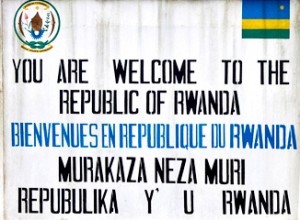English language imposed in Rwanda yet unspoken by 98% of the population

KIGALI�– A customer and a bank clerk nearly came to blows recently�in Kigali. The customer had asked the clerk to help him fill in the withdrawal slip in English, but the clerk refused. �How are we supposed to be able to fill in a document in English if you can�t do it yourself?� asked the angry customer.
For most Rwandans, English is a foreign language although its usage in banks, shops, the media and administration has significantly increased. As many Rwandans do not understand it, they struggle with paperwork and end up avoiding English-only stores and businesses altogether.e withdrawal slip in English, but the clerk refused. �How are we supposed to be able to fill in a document in English if you can�t do it yourself?� asked the angry customer.
In the streets of Kigali, French and Kinyarwanda (Rwandan) shop signs have been overtaken�by English. The same phenomenon is also taking place in the media. Rwanda’s only free-to-air TV station TVR, which is state-owned, broadcasts English-language programs from the BBC, Voice of America, Deutsche Welle and South African Broadcasting Corporation (SABC). Chronicles and news bulletins make up the only truly national programs. English also prevails on private radio.
�It�s as if banks and radio stations don�t want to reach the majority of Rwandans,� says a villager from Bugesera, in the Eastern Province.
Kinyarwanda, French and English are Rwanda’s three official languages. The last national census, carried out in 2002, showed that 99.7% of Rwandans living in the country spoke Kinyarwanda, 3.9% spoke French, 1.9% spoke English and 3% Kiswahili (Swahili is used as a lingua franca in East Africa). Older Rwandan graduates only learnt French and their native language while younger ones have learnt a little English.
Many Rwandans�refrain from shopping in stores that label everything in English: �We�re afraid of buying pet-food by mistake if a clerk isn�t around to translate the labels,� jokes a man from Kigali. �Shop owners should have their products labeled in Kinyarwanda, which most people speak,� he adds.
�Banks and other financial companies, which require their customers to fill in forms, should translate their documents in several languages,� suggests a local economist. For him, �to chose one language for commercial use excludes a large number of customers.�
Meanwhile, a growing number of young Rwandans have stopped using their mother tongue. Public servants who were trained in French force themselves to speak English – even though they hardly know how to – �to practice or simply to show off.�
�Young snobs and intellectuals alike have taken to speaking English only,� notes a teacher from Butare, the country�s second largest city.
In 2008, the Rwandan government decided to change the medium of education and administration from French to English. The government wanted �to give precedence to the language that would make Rwandans more competent.� They justified their decision by saying English was the language of business and would facilitate Rwanda�s integration into the East African Community (EAC) � whose members are all Anglophones.
�But graduates from Rwandan universities speak a broken mix of languages. Their English is not good enough to compete with their Anglophone neighbors,” explains a professor from the National University of Butare.
Three years after establishing English as Rwanda�s education and administration official medium, the government partly reversed its decision. Kinyarwanda is now the official language for the first three years of primary school education.
It�s worth it to note that�Rwanda, which has been a member of the International Organization of La Francophonie since the 1970s, joined the Commonwealth in 2009.
Source:�worldcrunch.com

2 comments
Yes it is still a problem many people ,students ,teachers and the entire community is gambling with the language. A lot has been done little has changed.
I�m afraid there is plenty of English propaganda about, leading to a false view that �they all speak English�.
I would like to argue the case for wider use of Esperanto. It is a planned language which, imp[ortantly, belongs to no one country or group of states. Will anyone be courageous enough to promote it?
Leave a Comment